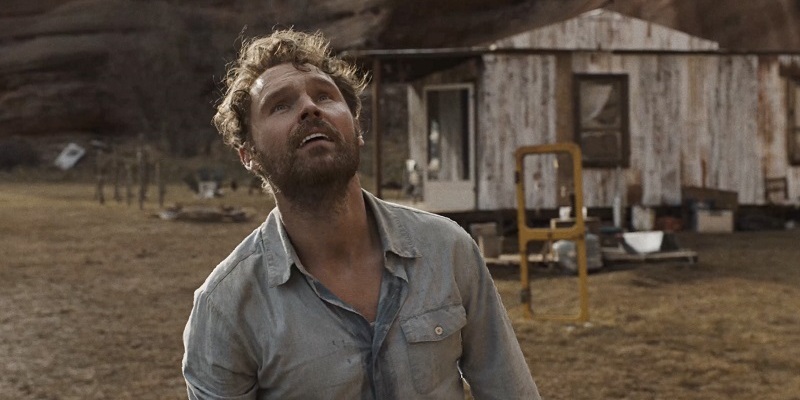
A man becomes trapped in a desert canyon with a mysterious woman while
being held captive by a group of feral children.
Review by
Eric Hillis
Directed by: Barnaby Clay
Starring: Scott Haze, Kate Lyn Sheil, Alex Montaldo, Charlie
Avink, Thatcher Jacobs, Michael Monsour

Writer/director Barnaby Clay's feature debut
The Seeding follows movies as disparate as the Japanese
arthouse classic Woman in the Dunes, the Stephen King adaptation Misery and the recent AI
thriller
Blank
in trapping its protagonist with a female figure whose threat comes
not from outright malevolence but from a form of adulation and a
compulsion to serve. Such films play on our fears of both confinement
and of being smothered with a love we can't requite.
Clay takes his setup almost directly from
Woman in the Dunes, transferring the central idea of Hiroshi Teshigahara's film to the
desert of the American SouthWest. It's here that we find Wyndham (Scott Haze), a photographer who has driven out to a remote area to best capture
a total eclipse. Like the clever 2013 sci-fi thriller
Coherence, here a celestial event seems to cause an imbalance of reality.
Immediately after the eclipse, Wyndham comes across a distraught young
boy who claims he's separated from his parents. Wyndham tries to help
the kid, who runs off, leading to Wyndham losing his bearings.

With no cellphone coverage, Wyndham stumbles around in a daze until
he comes across a cabin at the bottom of a wide cavern. Climbing down
a rope ladder, Wyndham discovers a young woman, Alina (Kaye Lyn Sheil), living alone, seemingly unperturbed by her surrounds, as though
she were living in suburbia. With no phone, Alina proves useless to
Wyndham but he agrees to stay the night and accepts her food. Early
the next morning he sneaks out, only to find the rope ladder has
vanished, leaving him stuck with Alina.
So far, so Woman in the Dunes, but Clay takes his film from the arthouse to the grindhouse by
replacing the Japanese villagers with a tribe of feral kids straight
out of a Hills Have Eyes knockoff. The kids taunt
Wyndham, at first telling him they'll pull him out of the canyon with
a rope, only to leave him hanging. At night they sneak down and
physically attack him. Occasionally they send down supplies, making
Wyndham and Alina reliant on their generosity. Clay likely named his
protagonist after author John Wyndham, whose novel 'The Midwich
Cuckoos' (filmed as Village of the Damned) similarly sees adults held hostage by malevolent children.
As his predicament becomes clear, Wyndham grows angry with Alina, who
is quite content with her situation. Drunk on a bottle of whisky sent
down by the kids, Wyndham gives into her sexual desires, but hates
himself in the morning.

Clay uses this derivative setup to initiate a bleak examination of
the modern male's fear of commitment and what it means to be free in
the 21st century. As recently as a century ago, Wyndham's predicament
would have been exactly what every man strives for. He has a mate,
food and shelter. But it's not enough. In the modern world such things
are taken for granted, the bread and butter of an existence in which
we spend our lives wanting to taste as many fillings as we can. When
Alina asks Wyndham what exactly he means by freedom, he pauses, before
replying "Choice." When asked what he would choose, the best he can
come up with is "a cheeseburger."
As Wyndham gradually resigns himself to his fate, so too does a sort
of Stockholm Syndrome descend on the viewer. We begin to think about
how we might deal with his situation, how food, shelter and love might
be enough after all. There's a certainty to Wyndham's new life, but
perhaps it's the very uncertainty of freedom that makes it so
appealing. Like Charlton Heston in Planet of the Apes, we may not like what we find on the other side of the canyon, but
the need to satisfy our curiosity is what makes us human.

Sheil is slowly carving out her own niche in playing enigmatic and
ethereal women in American indie cinema. She's quietly fantastic as
the taciturn Alina, giving little away at first but exposing her
humanity little by little. A scene in which she reacts to hearing
music for the first time via a video clip on Wyndham's camera is a
lovely piece of acting, as though Alina has suddenly been born again
into a new world of possibilities.
Clay tempers his film's small moments of humanity with acts of
shocking cruelty and arrestingly grim images. His film opens with the
disturbing sight of an infant wandering alone in the desert, nibbling
on a piece of meat that could either be a human finger or a severed
penis. This opening keeps us on edge as to how things might end up,
but the film's bleak climax takes us by surprise nonetheless.

